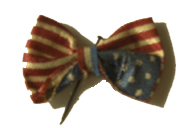

"A Voice in Their Own Government" - Suffrage and WWI
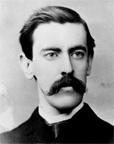 At
the beginning of his presidency in 1913, Woodrow Wilson was against suffrage,
strongly believing that women should remain outside of the political and public
sphere. But the United States' entry into World War I on April 6, 1917 caused
both the NAWSA and the National Woman's Party to institute new strategies for
gaining Wilson's and the public's support.
At
the beginning of his presidency in 1913, Woodrow Wilson was against suffrage,
strongly believing that women should remain outside of the political and public
sphere. But the United States' entry into World War I on April 6, 1917 caused
both the NAWSA and the National Woman's Party to institute new strategies for
gaining Wilson's and the public's support. 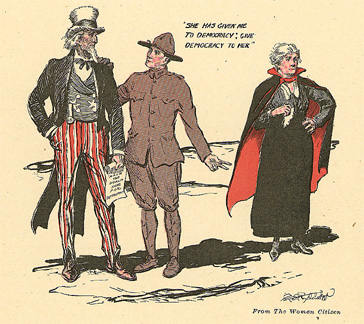
The NAWSA, led by Catt, made the decision to link the idea of suffrage and the
service of suffrage groups to women's work in war service. She wanted to create
the public perception that suffragists were patriotic and hard workers for the
country during the time of war. Catt hoped that by demonstrating women's practical
skills and patriotism the government would reward women with the vote.
The NAWSA publishing company reprinted Wilson's war messages and used its already
vast organizational structure to help women organize for war service.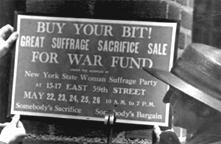 Caroline McCormick Slade (Mrs. Francis
Louis Slade) spoke for the campus chapter of the NCESL, linking the suffrage
campaign to participation in the war effort.
Caroline McCormick Slade (Mrs. Francis
Louis Slade) spoke for the campus chapter of the NCESL, linking the suffrage
campaign to participation in the war effort.
Although they had been expelled from the 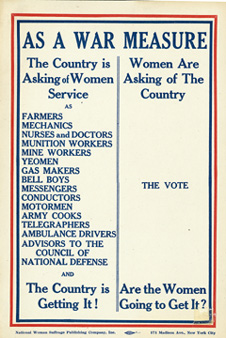 NAWSA,
the militant organizers of the 1913 parade maintained their Congressional Union
as an independent group, eventually re-organizing as the National Woman's Party
(NWP) in 1916. The NWP, guided by Alice Paul, mounted a more strident response
to the war. Risking the public perception of appearing unpatriotic, NWP members
continued their constant picketing of the White House and used the war as a
key issue in their protests and banners. Both on the streets and in its weekly
newspaper, The Suffragist, the NWP antagonistically reminded the government
of the contradiction of the United States fighting for and promoting democracy
abroad while American women were denied the right to vote.
NAWSA,
the militant organizers of the 1913 parade maintained their Congressional Union
as an independent group, eventually re-organizing as the National Woman's Party
(NWP) in 1916. The NWP, guided by Alice Paul, mounted a more strident response
to the war. Risking the public perception of appearing unpatriotic, NWP members
continued their constant picketing of the White House and used the war as a
key issue in their protests and banners. Both on the streets and in its weekly
newspaper, The Suffragist, the NWP antagonistically reminded the government
of the contradiction of the United States fighting for and promoting democracy
abroad while American women were denied the right to vote.
The arrests of NWP picketers began after the U.S. entry into World War I. On
June 22, 1917 Lucy Burns and Katherine Morey were arrested for carrying a protest
banner with a quotation from Wilson's war message:
The caption in Catt's photo album reads: "Real soldiers who stand for real democracy 'over here' and are ready to fight for world democracy 'over there.' These banners were carried in Grand Rapids."We shall fight for the things which we have always held nearest our hearts - for democracy, for the right of those who submit to authority to have a voice in their own government.
![]()